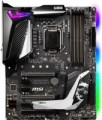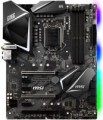M.2 SSD cooling
Motherboard-integrated
cooling for M.2 SSD drives.
This connector allows you to achieve high speed, however, for the same reason, many M.2 SSDs have high heat dissipation, and additional cooling may be required to avoid overheating. Most often, the simplest radiator in the form of a metal plate is responsible for such cooling — in the case of an SSD, this is quite enough.
Audiochip
The model of the audio chip (a module for processing and outputting sound) installed on the motherboard. Data on the exact name of the sound chip will be useful when looking for detailed information about it.
Modern "motherboards" can be equipped with fairly advanced audio modules, with high sound quality and extensive features, which makes them suitable even for gaming and multimedia PCs (although professional audio work will still most likely require a separate sound card). Here are the most popular modern audio chips:
Realtek ALC887,
Realtek ALC892,
Realtek ALC1150,
Realtek ALC1200,
Realtek ALC1220,
Realtek ALC4050,
Realtek ALC4080,
Supreme FX.
USB 3.2 gen1
The number of native USB 3.2 gen1 connectors provided on the back of the motherboard. In this case, traditional, full-size USB A ports are meant.
USB 3.2 gen1(formerly known as USB 3.1 gen1 and USB 3.0) is a direct successor and development of the USB 2.0 interface. The main differences are a 10-fold increase in the maximum data transfer rate — 4.8 Gbps — as well as higher power supply, which is important when connecting several devices to one port through a splitter (hub). At the same time, peripherals of other versions can be connected to this connector.
The more connectors provided in the design, the more peripheral devices can be connected to the motherboard without the use of additional equipment (USB splitters). There are boards on the market that have
more than 4 USB 3.2 gen1 ports on the back panel. At the same time, we note that in addition to the connectors on the rear panel, connectors on the board itself (more precisely, ports on the case connected to such connectors) can also provide a USB connection. See below for more on this.
USB 3.2 gen2
The number of native USB 3.2 gen2 connectors provided on the back of the motherboard. In this case, we mean traditional, full-size USB A ports.
USB 3.2 gen2(formerly known as USB 3.1 gen2 and simply USB 3.1) is the evolution of USB 3.2 after version 3.2 gen1 (see above). This standard provides connection speeds up to 10 Gbps, and to power external devices in such connectors, USB Power Delivery technology (see below) can be provided, which allows you to output up to 100 W per device (however, Power Delivery support is not mandatory, its presence should be specified separately). Traditionally for the USB standard, this interface is backwards compatible with previous versions — in other words, you can easily connect a device supporting USB 2.0 or 3.2 gen1 to this port (unless the speed will be limited by the capabilities of a slower version).
The more connectors provided in the design, the more peripheral devices can be connected to the motherboard without the use of additional equipment (USB splitters). In some models of motherboards, the number of ports of this type is
5 or even more. At the same time, we note that in addition to the connectors on the rear panel, connectors on the board itself (more precisely, ports on the case connected to such connectors) can also provide a USB connection. See below for more on this.
PS/2
The number of PS/2 ports provided in the design of the motherboard.
PS/2 is a dedicated port designed to connect exclusively to keyboards and/or mice. The traditional motherboard configuration for a PC provides 2 such ports — for the keyboard (usually highlighted in lilac) and for the mouse (green). However, there are boards with one connector, to which you can connect any of these types of peripherals, to choose from. Anyway, the presence of PS/2 can save the user from having to occupy USB ports for the keyboard / mouse; this is especially useful if you have to deal with a lot of other USB peripherals. On the other hand, for a number of reasons, this connector is considered obsolete and is used less and less; and PS/2 peripherals are produced mainly in the form of USB devices, additionally equipped with PS/2 adapters.

